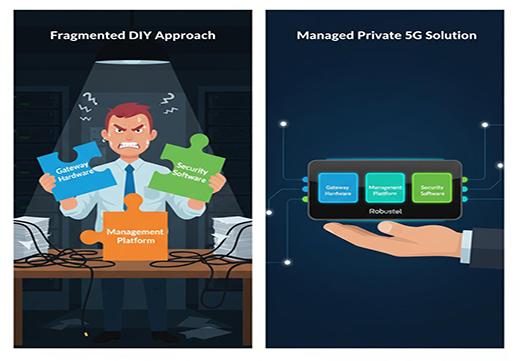
What is Managed Private 5G? A 2025 Guide for Enterprises
|
|
Time to read 5 min
|
|
Time to read 5 min
As enterprises demand more control, security, and performance from their wireless infrastructure, managed private 5G is rapidly becoming the new standard.
But what does "managed" actually mean in this context? It's a complete, vertically integrated ecosystem that combines powerful edge computing gateways with a sophisticated cloud management platform.
This guide will break down the core components of a managed private 5G solution, why it's superior to a fragmented, multi-vendor approach, and how a platform combining the Robustel EG5120 Edge Gateway and the RCMS cloud service delivers the security, scalability, and edge intelligence that modern industrial applications demand.
I've spoken with many CTOs and operations managers who are captivated by the promise of private 5G—ultra-low latency, massive bandwidth, and unparalleled security for their factory, port, or large-scale facility. The technology is undeniably powerful. But the initial excitement often fades when they face the reality of deploying and, more importantly, managing the network.
A private 5G network is more than just a local 5G core and some antennas. You need intelligent devices at the edge to actually use that network. The "do-it-yourself" approach—sourcing edge gateways from one vendor, a device management platform from another, and security software from a third—creates a complex and fragile system. Let's be clear: a truly robust network requires a cohesive, managed approach. This is why a vertically integrated managed private 5G offering is a game-changer. It provides a single, unified solution for hardware, software, and management, a core concept of any modern Industrial IoT Edge Gateway deployment.

A true managed private 5G solution is an end-to-end ecosystem built on three foundational pillars. The seamless integration of these three layers is what delivers the value.
The starting point for any high-performance managed private 5G network is the edge gateway. The Robustel EG5120 is purpose-built for these demanding enterprise and industrial environments.

This is what elevates a powerful piece of hardware into a managed private 5G solution. The EG5120 is seamlessly integrated with the Robustel Cloud Manager Service (RCMS).
A managed private 5G network is only as smart as the applications running on it.

A managed private 5G solution is the strategic answer to the complexity and security challenges of modern enterprise connectivity. It moves beyond the fragmented, do-it-yourself model and provides a single, cohesive, and secure ecosystem for your private network. By combining a high-performance edge computing gateway like the Robustel EG5120 with a powerful and cost-effective cloud management platform like RCMS, you get a vertically integrated solution that delivers the reliability, scalability, and lower Total Cost of Ownership (TCO) that your business demands. It's the key to unlocking the true potential of 5G edge computing.
A1: A public 5G network is the service you get from major carriers. A private 5G network is a dedicated, localized cellular network built exclusively for a single enterprise, providing greater control over security, performance, and data traffic.
A2: A private 5G network provides the ultra-low latency connection. An edge computing gateway like the EG5120 provides the on-site processing power to take advantage of that low latency. It allows you to run applications like real-time AI and machine control that would be too slow if you had to send data to the cloud and back.
A3: While the initial hardware cost might be comparable, the Total Cost of Ownership (TCO) of a managed offering is almost always lower. When you factor in the massive savings from eliminating third-party management software licenses, reducing on-site technician visits through ZTP, and simplifying security management, the integrated approach provides a far better long-term value.